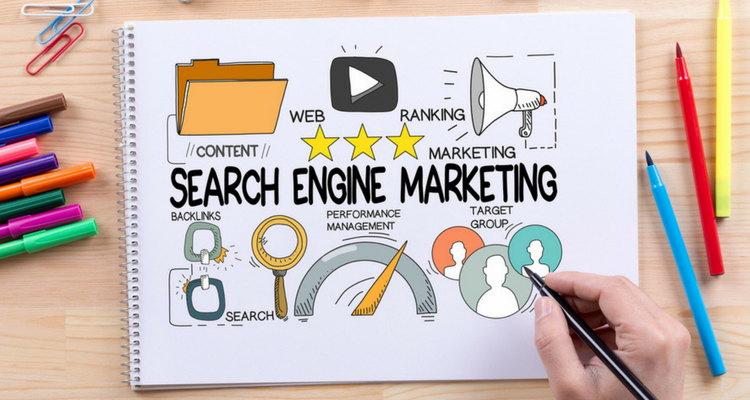The battle for local customers is fierce and businesses spend millions of dollars to outrank competitors on Google and other search engines. Getting that top spot on Google could be the difference between growing your business and struggling to find your next customer.
In this article, we’ll break down some of the most important elements to get right if you want your business to have a chance at that number one spot and how to identify why your competitors might be outranking you.
What Is Local SEO And Why Should I Care?
SEO refers to the process of optimising your website and presence online to increase the chances of potential customers discovering your business. Local SEO focuses on improving that visibility for a specific geographic area.
In a nutshell, local SEO helps your business become more visible to customers in your local area at the moment they’re searching for your products or services.
Start With Search Intent
If you’re a local business, you’re competing with other businesses in your local area, not the entire planet. So understanding the words people use when they’re searching for businesses like yours is important. Let’s use a Newcastle based carpet cleaning business as an example to see how different words, or search queries, deliver different kinds of results based on Google’s understanding of the user’s search intent.
When you’re thinking about possible search queries people use, you might come up with a list that looks like this:
- Carpet cleaning Newcastle
- Carpet steam cleaning
- How to remove carpet stains
Now let’s see how Google interprets the search intent based on these different search queries.
When you enter ‘carpet cleaning newcastle’ into Google, you’re presented with a map of local businesses and traditional organic results directing you to websites with a local focus.
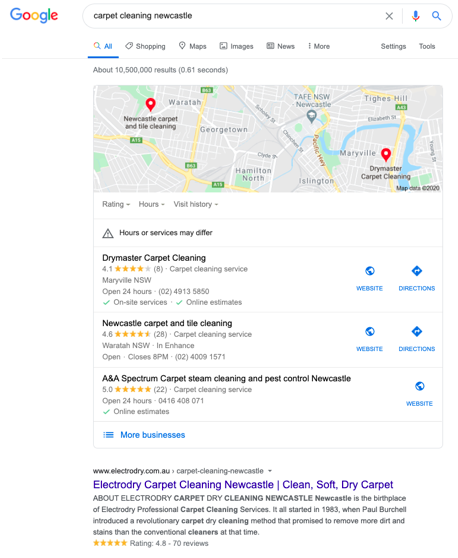
You’ll get a similar result when you enter ‘carpet steam cleaning’ into Google because they know you’re most likely looking for a local business to help you clean your carpets.
Now let’s see what Google shows when you enter ‘how to remove carpet stains’.
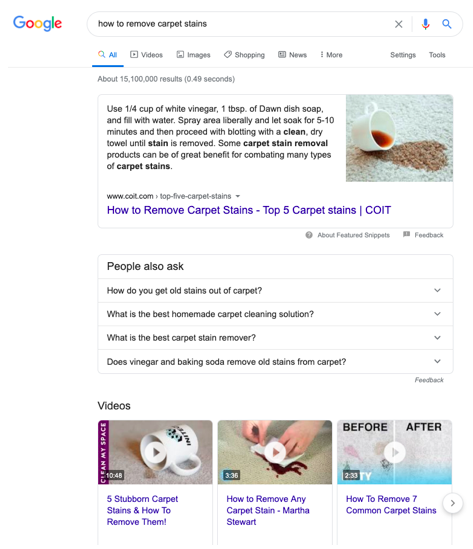
You’re presented with a short ‘how-to’ from an international website and a list of popular Youtube videos explaining how to remove carpet stains.
There is no local focus in these search results.
So it’s important to understand that as a local business, you want to focus your initial local SEO efforts around search queries that yield local search results. Otherwise, you could be competing against powerful international websites for users that could be thousands of kilometres away.
Now that you understand the types of search queries you should focus on, are you sending the right signals to let search engines know you’re the best business to show in the top spot?
Who Shows Up In The #1 Spot And Why?
There are over 200 ranking signals that Google uses to determine which website shows up in the number one spot. So being able to pinpoint exactly why one website shows up versus another is tricky, but in local SEO, the basics count for a lot.
One of the most important requirements to show up in the number one spot for a local search query is to send consistent and clear signals about your business’s physical location and the geographic locations that you provide services to.
If your business provides glass repairs to homes in Hobart, it’s important Google knows that you not only repair glass but that you’re based in Hobart and provide services to customers in Hobart.
You can tell Google in a number of ways, but we’ll focus on two very simple ones that are essential.
Local Business Citations
Ensuring your business contact and location information is accurate and consistent across the internet is critical to ranking well locally. One of the easiest ways to establish that information is through local business citations that contain your business name, business address, and business phone number in online directory listings like Yellow Pages, Facebook, Google My Business, and others.
Google uses this information to verify that you’re a legitimate business that can be trusted. It also establishes your physical location to help Google reference it when they’re returning search results to their users.
Your Website
You have complete control of your own website, so it’s easy to include location information in a few important places to send the right signals to Google. Amazingly, a lot of local businesses don’t do this, so it should be an easy way to start setting your business apart.
The first place you should include your primary service location is in the title and heading of your home page. That sends a very clear location signal to both Google and your website’s users.
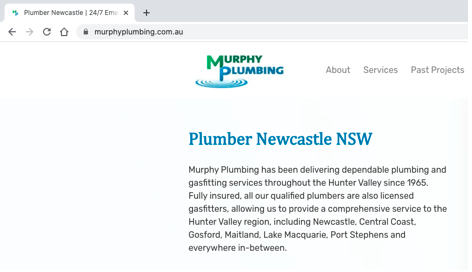
You should also include your phone number and physical location in both the footer of your website and on your contact page.
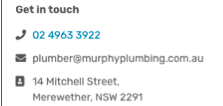
Email footer – contact details

Website footer – contact details
These two simple updates to your website will put you ahead of a lot of competition.
Now that you understand the critical location signals that will help you rank locally, let’s look at a few other important signals Google uses to determine rankings.
Link Signals
With thousands of websites being created every day across a wide range of topics, Google uses link signals to identify trusted and authoritative websites that are likely to satisfy the user’s search query.
Simply put, whenever another website links to your website, Google uses that information to establish a link signal. Lots of positive link signals help you rank higher, while lots of negative link signals can hurt your rankings. If your website doesn’t have any links from other websites, Google won’t have any link signals to work with, which can make it harder to rank well.
So what does a positive link signal look like?
As a local business providing a specific type of service, like glass repairs, a link from a home improvement website would be great. Or a link from an event in your local area would also be great. Each of those links has a logical connection with either your location or the type of service you provide.
In contrast, a link from a foreign website that has no connection to glass repairs could be interpreted by Google as a negative link signal.
So it’s important to understand that not all links are equal in Google’s eyes. Which means that as you’re building your link profile by generating and sharing unique and valuable content, you should focus on obtaining links from websites that:
- feature content that would be valuable to your customers or customers like yours, or
- are relevant to your local area
An easy way to check the quality of your link signals compared to your competitors is to use ahrefs website authority checker. This tool will give your website a rating from 0-100 by assessing the quality and quantity of your link profile. It’s important to assess your score relative to your competitors because if you have a score of 15 and your competitor has a score of 8, you’re still in a good position relative to them even though your score might seem low.
Review Signals
Over the last decade, online reviews have become critical to helping consumers make purchasing decisions. The same holds true when consumers are looking for a local product or service with 82% of consumers reading online reviews for local businesses according to Bright Local’s consumer review.
Reviews not only help improve search rankings in your local area, but they also have the ability to significantly influence a consumer’s likelihood to purchase from a particular business.
However, most local businesses don’t have a process in place to ask their customers for feedback or a way to make it easy for them to leave a positive review online. That process could be as simple as having a ‘Review Us’ link at the bottom of your emails or you could use a customer review automation platform to help you capture reviews.
The important thing is to ask, because hoping customers will leave you a positive review leaves your business exposed to those rogue negative reviews that will inevitably come through.
Ranking Against Your Competitor
So if you’re a small business owner and you want to know why your competitor is outranking you, go ahead and apply the lessons we’ve covered in this post to your online presence.
- Identify valuable keywords that display localised results
- Check your website to see if you mention both your primary service and your primary location on your home page
- Make sure your phone number and physical address are visible on your website
- Create or update local business citations to build trust with Google
- Compare your website’s domain rating with ahrefs against your competition
- Assess the strength of your review profile against your competitors
Just doing those six simple things for your business will help you develop a local SEO strategy and improve your local search rankings.
If you liked this article on organic and local traffic, check out these other Marketing.com.au articles:
- Clever Content Optimisation Tactics Necessary to Avoid Common SEO Mistakes
- Local SEO Guide for Growing Your Business
- How to Perform a Local SEO Audit All By Yourself
- Become a Data Detective and Solve Your Own Marketing Problems
Matt Jackman
Latest posts by Matt Jackman (see all)
- Why Are My Local Competitors Outranking Me? - January 29, 2021








